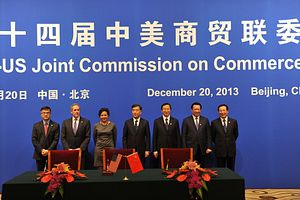The United States and China have one of the largest trading relationships in the world, at over $550 billion per year. U.S. policymakers are right to cry foul when the Chinese government distorts that trade to protect domestic interests. Unfortunately, U.S. policymakers do the same thing and, in the process, harm the U.S.-China relationship.
One example is Washington’s continued use of so-called “non-market economy methodology” when deciding whether Chinese goods are being “dumped” into the U.S. market at unfairly low prices. The designation is a holdover from the Cold War that exists today only because its mystical formula enables U.S. officials to impose higher punitive tariffs to protect inefficient domestic industries.
The practice is actually illegal under World Trade Organization rules. But when China joined the organization in 2001, the United States insisted that an exception be created, allowing it to continue discriminating against Chinese imports for 15 years. Time has passed, and unless the United States government changes its practice by the end of 2016, it will be in flagrant violation of U.S. trade obligations.
Unfortunately, the United States is almost certainly not going to comply. There is a shameful history of law-breaking by U.S. trade officials abusing the non-market economy methodology. Both U.S. law and international trade rules have been consistently stretched or outright ignored for decades, and there is little indication that this trend will change.
The U.S. government tries to justify its discriminatory treatment of Chinese imports by claiming that Beijing is in fact still a non-market economy. To be sure, the Chinese government retains an outsized role in directing its country’s economic affairs through influence in the labor market and banking industry as well aggressive macroeconomic interventions. But the days of large-scale central planning are long gone.
Most importantly, Chinese exporters are profit-seeking enterprises that make their own pricing decisions based on market factors like the cost of production and consumer demand. Critics point to government influence in upstream industries that affects the price that exporters pay for raw materials, but those distortions simply do not justify a non-market economy designation. For one thing, dumping determinations are supposed to compare export price with domestic sales—if both are distorted by low costs of production, there is no dumping. Secondly, in many industries, China’s government is less distortive of production costs than other developing countries that have never been treated as non-market economies.
Furthermore, if Chinese firms are getting an unfair advantage due to government intervention, there are other mechanisms for U.S. authorities to use against them. The United States can impose duties to offset foreign subsidies without violating WTO rules. The procedures for imposing those duties are much more transparent than the non-market economy methodology used today.
China’s non-market economy designation is not justified by economic realities or by an interest in countering unfair Chinese government policies. Its purpose and impact are to increase the discretion of U.S. trade officials to protect some U.S. businesses from legitimate Chinese competition.
It’s very important to understand the costs of that protection. In addition to the general harm that trade barriers impose on consumers and businesses, non-market economy treatment threatens the U.S.-China trade relationship and the global trading system.
We should be careful not to underestimate the negative impact that reneging on WTO commitments will have for U.S. businesses trading or investing in China. The issue of non-market economy treatment ranks much higher on China’s foreign economic policy priorities than keeping it does for the United States. For example, China has made revoking designation a necessary prerequisite for negotiating bilateral free trade agreements with other countries.
American credibility is also at stake. U.S. trade officials and politicians are constantly accusing China of skirting global trade rules. A common refrain is that China’s newly acquired status as an economic power entails greater responsibility. Such exhortations ring hollow when the United States continues to treat China as a second-class citizen, especially when that treatment violates fundamental rules of the very system China is expected to value.
The good news is that the United States has two years to make this right. The Obama administration can act to end the entire dispute simply by reclassifying China as a market economy. The sooner it does so, the more impact the change will have on fostering goodwill, something the U.S.-China trade relationship desperately needs. If this administration doesn’t act, the next administration may come into office with a very ugly trade conflict on its hands.
Bill Watson is a trade policy analyst at the Cato Institute’s Herbert A. Stiefel Center for Trade Policy Studies and author of the new Cato Institute study, “Will Non-Market Economy Methodology Go Quietly into the Night? U.S. Antidumping Policy Toward China after 2016.”

































